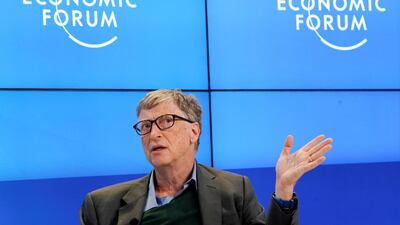The market value of Netflix ($118 billion) has just overtaken that of the US investment bank Goldman Sachs, yet another indicator of how global economic power has passed into the hands of the big tech companies.
Delegates at last week’s World Economic Forum (WEF) in Davos last week talked endlessly of the dominance of the Big Five, Apple, Google, Microsoft, Amazon and Facebook, which are now the biggest companies in the world.
At Davos 10 years ago the Big Five were ExxonMobil, Walmart, China National Petroleum, the Industrial and Commercial Bank of China and Proctor and Gamble: two oil companies, two banks and a consumer goods manufacturer. Three of them were American and two Chinese. Economic power then was in the hands of the big banks which had become so powerful that the hot topic of debate was their threat to the world’s financial stability. Nine months later those fears were confirmed when Lehman dramatically crashed into bankruptcy, just about bringing the house down with it.
Today, the top five are all American tech companies, and even the mighty Exxon has dropped out of the top 10. In 2008, there were 35 US companies and 41 Europeans in the top 100; now there are 55 American and just 22 from Europe, a measure of both growing American dominance, particularly of the tech sector, and relative European decline.
But the story is not just about the rise of the American tech giants – it is also about the rise of the Chinese, too, with Tencent and Alibaba, both with market values of around $500bn, moving into the top 10 and rapidly gaining ground. Given their trajectory and the relative size of the market they play in, it won’t be long before they challenge for the very top.
The size of the tech companies mirrors their disruptive impact on the corporate world. Amazon has turned the retailing industry upside down, a revolution which is only just getting under way. Google ($73bn) and Facebook ($40bn) now account for over 50 per cent of all digital advertising revenues, with Amazon and Twitter also growing rapidly. The Wall Street Journal carried a feature recently suggesting that within a few years Amazon could challenge the big two tech titans. Sir Martin Sorrell, chief executive of WPP, says the firm placed more than $200m with Amazon in 2017 with much more to come in 2018.
___________
Read more:
Amazon's Bezos is rich but not the richest yet
City of London is the centre that will hold
___________
This week, reinforcing its place at the top, Apple will announce its first quarter figures (three months to December 31), traditionally its biggest quarter, which analysts widely expect to be the highest in corporate history, with net income of $19bn. The company has prepared the way for the announcement, saying in November that it was expecting “its biggest quarter ever”, but even that may be under-emphasising the scale of what we are about to see. Analysts at Canalys, a market research group, reckon that Apple shipped 29 million of its new iPhone Xs in the final quarter, making it the world’s top-selling smartphone in the run-up to Christmas. In total, they estimate that Apple sold 81 million iPhones - about two-thirds of its sales - in the three-month period, pushing group revenues to $86bn. Others are looking for even more: Morgan Stanley predicts revenues will jump 18 per cent to $92bn, with net income as high as $21bn.
"Apple saw stellar iPhone X sales over Christmas," Neil Cybart, an analyst at Above Avalon, told the Financial Times. Apple managed to overcome manufacturing issues, which have dogged the launch of new models in the past, and ramped up production faster than anyone expected, he says. The iPhone X starts at $999 and Cybart reckons that its success has pushed the average selling price of an iPhone to more than $800, yet another new record and $100 more than most analysts projected.
The reporting season for the big tech companies is now in full swing with Amazon, Facebook and Alphabet (Google) all expected to report higher revenues and profits this week. They will need to just to keep the stock market boom, which has relied heavily on their performance this past year, going and which this week looked as if it may finally be running into the correction so many have been forecasting for over a year now.
Netflix shares are up by 80 per cent in the past year (they rose 10 per cent in a single day last week), an astonishing performance for a company that even a few years ago was regarded as a minor player in the mighty media market. It is now twice the size of Rupert Murdoch’s empire and is challenging Walt Disney for the top spot. “We had a beautiful Q4,” the company told its shareholders last week.
Ten years from now, which sector will dominate the stage at Davos, as the oil companies and then the banks, once did? It will probably still be tech, and the betting is that it will be Chinese first, US second and everyone else nowhere. Unless of course the listing of Aramco finally gets off the blocks, in which case the financial markets will have something else to talk about.
